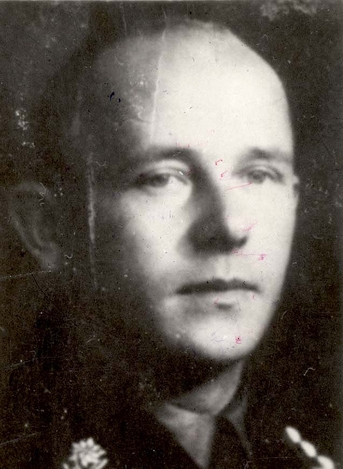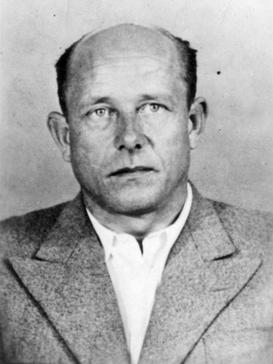<Back to Index>
- Deputy Administrator of Operation Reinhard, Major of the Schutzstaffel Hermann Julius "Hans" Höfle, 1911
PAGE SPONSOR


Hermann Julius "Hans" Höfle (19 June 1911 - 21 August 1962) was an Austrian born SS-Sturmbannführer (Major). He was deputy to Odilo Globocnik in the Aktion Reinhard program, serving as his main deportation and extermination expert. As such he was heavily involved in crimes against humanity.
Born in Salzburg, Austria, Höfle joined the NSDAP on August 1, 1933, with party number 307,469. He joined the SS at the same time. Before the war, he worked as an auto mechanic.
After the conquest of Poland, he served in Nowy Sącz, in Southern Poland. In November 1940 he served as an overseer of a Jewish labor camp southeast of Lublin. Up to December 1941 Höfle was in Mogilev, Russia. He was involved in deportations to the camps of Belzec, Sobibor and Treblinka. He lived and worked from the Aktion Reinhard headquarters with the Julius Schreck Barracks, Ostland Strasse, in Lublin.
Höfle was "Coordinator" of Operation Reinhard and deputy to Odilo Globocnik (effectively making Höfle second - in - command within the program), serving as his main deportation and extermination expert. Höfle had chief authority of Operation Reinhard beside Globocnik. At the beginning of the operation, he held the rank of Hauptsturmführer (Captain). SS members, including those from Action T4 who were assigned to the operation, reported to the headquarters in Lublin and were instructed to their duties by Höfle. For an example of the limited paperwork, every member of Operation Reinhard signed the following declaration of secrecy:
I have been thoroughly informed and instructed by SS Hauptsturmführer Höfle, as Commander of the main department of Einsatz Reinhard of the SS and Police Leader in the District of Lublin:
1. that I may not under any circumstances pass on any form of information, verbally or in writing, on the progress, procedure or incidents in the evacuation of Jews to any person outside the circle of Einsatz Reinhard staff;
2. that the process of the evacuation of Jews is a subject that comes under "Secret Reich Document," in accordance with censorship regulation Vershl V. a;....
4. that there is an absolute prohibition on photography in the camps of Einsatz Reinhard;....
I am familiar with the above regulations and laws and am aware of the responsibilities imposed upon me by the task with which I have been entrusted. I promise to observe them to the best of my knowledge and conscience. I am aware that the obligation to maintain secrecy continues even after I have left the Service.
As head of the "Main Department" (German: Hauptabteilung), Höfle was in charge of the organization and manpower of Operation Reinhard. He coordinated the deportations of Jews from all areas of the General Government and directed them to one of the camps. The deportation orders were coordinated and channeled through SS authorities from Höfle's office in Lublin, through the district SS and Police Leaders, down to the localities where the expulsions were to take place.
Höfle personally oversaw the deportation of the Warsaw Ghetto. On the morning of 22 July 1941, Sturmbannführer Höfle, accompanied by an entourage of SS and government officials, arrived at the Judenrat in the Warsaw Ghetto and announced to the chairman, Adam Czerniaków, that the Jews, regardless of sex or age and with but a few exceptions, were to be evacuated to the East. The exceptions were workers in German factories who had valid work permits, Judenrat employees, the Jewish Order Service, hospital patients and employees, and the families of the exempt. The deportees were allowed to carry with them 15 kg of baggage, food for three days, money, gold and other valuables. The order also called for 6,000 Jews to report to the Umschlagplatz every day by 4 p.m. to board the trains for deportation. That same day Czerniaków noted in his diary:
Sturmbannführer Höfle (who is in charge of the evacuation) asked me into his office and informed me that for the time being my wife was free, but if the deportation were impeded in any way, she would be the first one to be shot as a hostage.
Around March 1942 in the General Government, a substitution policy developed for a short time in which Polish workers who were sent to the German Reich were gradually replaced with Jewish laborers. It became standard procedure to stop deportation trains from the Reich and Slovakia in Lublin in order to select able - bodied Jews for work in the General Government; the others were sent on to their deaths in Belzec. In this way, many Jews were temporarily spared death and instead relegated to forced labor. Hermann Höfle was one of the chief supporters and implementers of this policy.
Höfle also played a key role in the "Harvest Festival" massacre of Jewish inmates of the various labor camps in the Lublin district in early November 1943; approximately 42,000 Jews were murdered during this operation. Höfle rejoined Globocnik in Trieste, after various missions in the Netherlands and Belgium.
On January 11, 1943, Höfle sent a radiogram from Lublin to SS-Obersturmbannführer Franz Heim in Kraków, who was at the time the deputy commander of the Security Police and SD in the General Government, and to SS-Obersturmbannführer Adolf Eichmann in Berlin. The message documented the total deportations of Jews to the four Operation Reinhard camps through 31 of December 1942. Today this document is called the Höfle Telegram.
After the end of the war, Höfle was found hiding in Möslacher Alm on the Weißensee in Kärnten on May 31, 1945 by the British, along with SS storm troopers Ernst Lerch and Georg Michalsen. After two years in the British interrogation center Wolfsberg at Kärnten, he was released to the Austrian judicial system. On October 30, 1947, under oath, he was released to continue his earlier occupation as an auto mechanic in his birthplace, Salzburg.
After an extradition request on July 9, 1948 by the Polish government, he fled to Italy where he lived under a false name until 1951. Later he returned to Austria, and then emigrated to the Federal Republic of Germany. There he was employed briefly as an informant for U.S. Army Counterintelligence.
After the war, he was interned by the British, but was released. For only a brief period of time he worked in the Gehlen organization. He was eventually arrested, but committed suicide by hanging in a Vienna prison cell before his trial could begin.